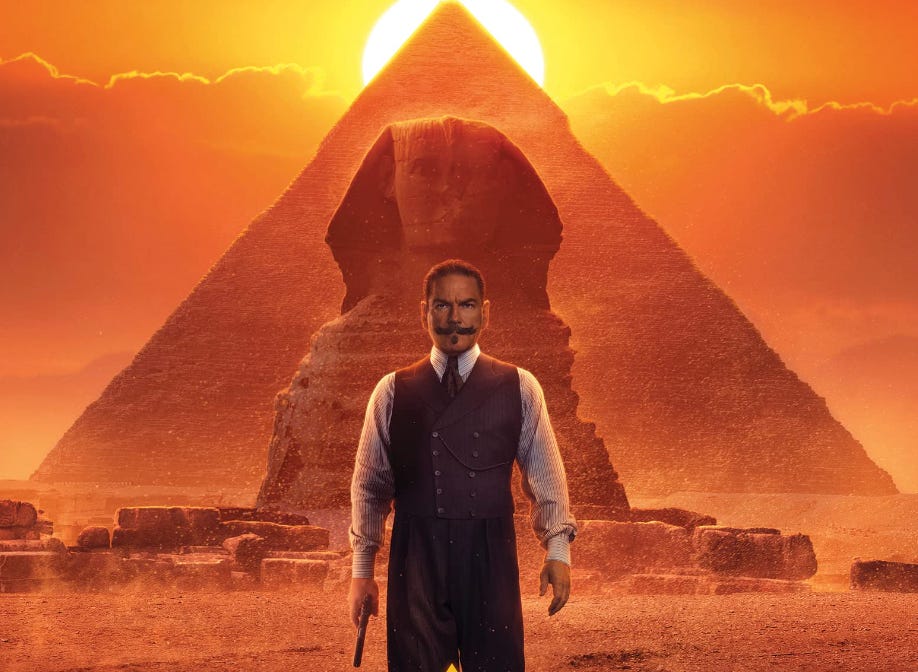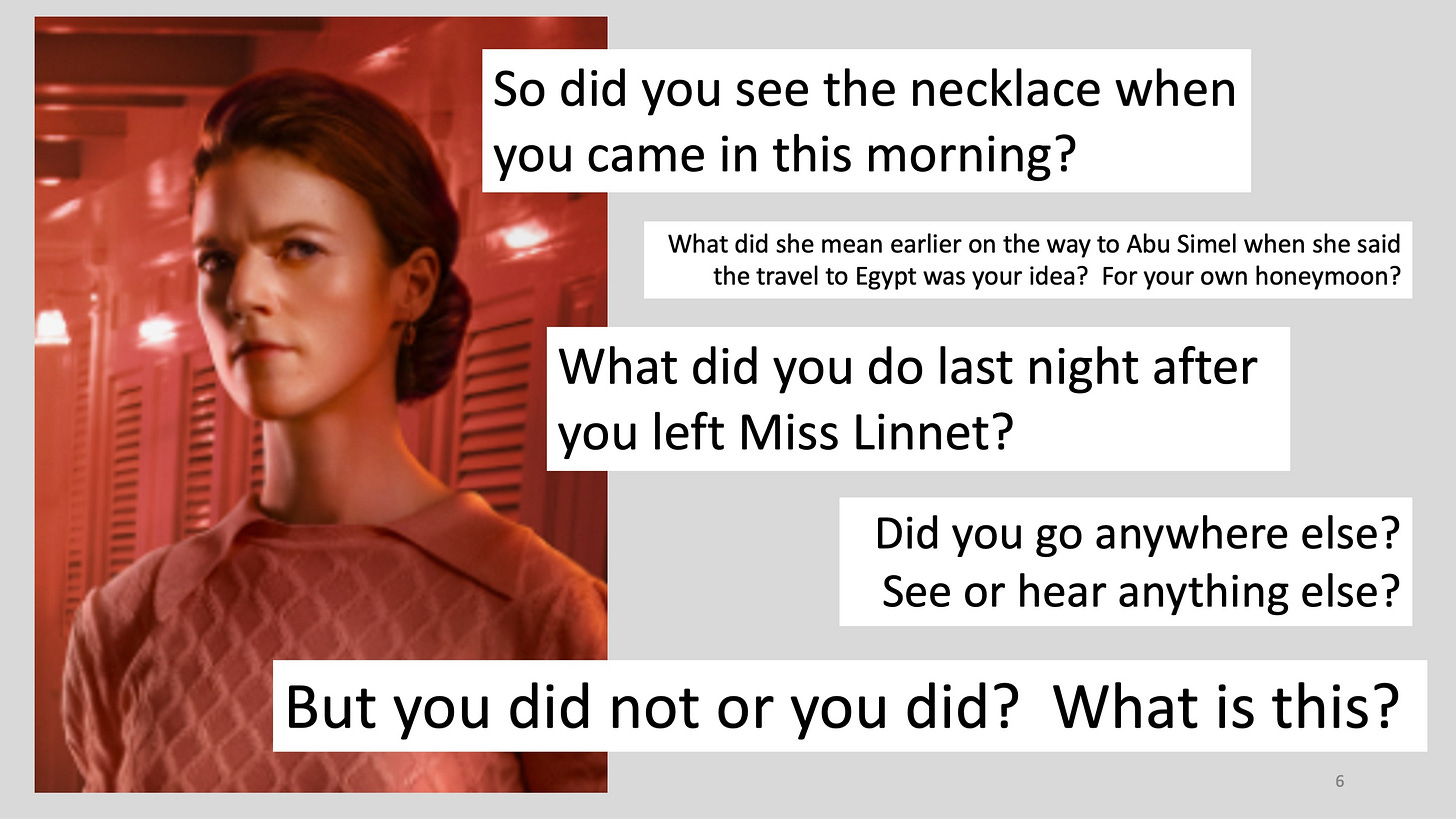How Hercule Poirot Botched a Key Interview
A Look at Death on the Nile - the book and the 2022 movie
Interviewing people is a key part of any investigation. Unless you’re Hercule Poirot, you won’t just happen to be at the scene of the crime when it happens and you will have to reconstruct what happened afterwards from people who were there.
And interviewing is more than simply asking some questions. Strategy and thought can play a major role in making an interview successful.
To illustrate this point, and to better show what to do and what not to do, let’s look at a key interview from Agatha Christie’s Death on the Nile, as depicted in the novel and in the 2022 movie starring Kenneth Branagh.
I find this particular interview fascinating because Poirot simply botched it. In fact, he botched it so immensely that much of the plot of Death on the Nile (including two additional murders) flows from his mistakes in the interview.
Spoilers below!
In Death on the Nile, Linnet Doyle is murdered by her husband, who planned the murder with Linnet’s former best friend, Jacqueline de Bellefort. The two murderers stage an elaborate scene to establish their alibis, but the husband murders Linnet while other people think the husband is left alone in a saloon, unable to move.
The murder goes off well, except for one big hitch. When the husband runs to his wife’s room, he is seen by his wife’s maid, who happens to be nearby.
Poirot is on the boat when the murder happens, but sleeps through the murder and commotion, in part due to his being drugged by the husband over drinks.
Poirot then proceeds to interview the witnesses. In the movie, Poirot uses in many interviews a technique that I would strongly advise against using in real life. He basically throws out speculative theories that blame the person he’s interviewing and he sees how they react. This type of confrontational interview can work if the suspect is caught off-guard and makes what the law calls an “excited utterance,” but I don’t think this works well in real life.
But the interview of Linnet Doyle’s maid, Louise Bourget (played by Rose Leslie), was the worst interview of all, both in the movie and in the book. This interview occurs in chapter 14 of the book and at the 1:10 mark in the movie.
In both versions, Poirot makes a strategic error at the very beginning of the interview. He decides to interview Bourget in the presence of Linnet’s husband, who was at least a witness in the matter, even if Poirot did not yet suspect him of being the actual murderer.
In general, it’s best to interview witnesses individually. This helps provide a fuller perspective on what happened, it makes a clearer record of who knows what.
Interviewing witnesses together can lead to confusion about who observed which events and thus about what happened. This is seen in the book, when Poirot interviews two witnesses together about what happened in the saloon (chapter 13). The back-and-forth between the two witnesses is hard to follow, skips over key details, and results in a confusing record. Interviewing witnesses together also creates the risk of people remembering things incorrectly because they want to be consistent with what others say.
Interviewing witnesses individually will sometimes lead to discrepancies between their accounts, but that’s better than risking people changing their accounts or “getting their stories straight” (or allegations that they did).
Poirot simply should not have interviewed the victim’s maid in the presence of the victim’s husband. There were no extenuating circumstances that might have forced him to conduct the investigation more quickly. And while Poirot may have wanted someone present to observe the interview and possibly take notes, he could have gotten someone neutral (such as the ship’s captain) to play this role, rather than someone who clearly had a personal stake in the outcome and thus a potential bias.
The murder of Linnet Doyle leads to other murders because of Poirot’s error. Bourget ends up directing her answers to Linnet’s husband, hinting to him that she knows something but will keep quiet if she is paid off. Poirot misses all this, and this situation leads to Bourget keeping quiet about what she saw, Bourget getting paid off and then murdered, and then another person getting murdered after seeing what happened to Bourget.
In terms of his actual questions, Poirot does start off with good, fact-specific questions that focus on what Bourget observed. From the book:
“When did you last see Madame Doyle alive?”
“What time was that?”
“How long did all that take?”
“And when you had left her, what did you do?”
These are good, fact-specific questions that cannot be answered with a simple yes or no and do not assume the answers for her. Open-ended questions that get Bourget to talk.
But then Poirot asks a very poorly formed question: “And you heard or saw nothing more that can help us?” This puts words in the witness’s mouth before she says anything. It is also difficult to follow and unpack – it calls for a yes or no answer, but it’s not clear what a “yes” would mean here. And rather than asking Bourget to simply report what she observed, it asks her to speculate about what might be useful for the investigation, even though she herself is not a professional investigator.
Bourget then gives an odd response: “How could I, Monsieur?” she says in the book version.
Poirot then gives a terrible response. “That, Mademoiselle, is for you to say, not for us,” he says in the book. “But you did not or you did? What is this?” he says in the movie. Either way was a mistake.
When a witness answers a question in an odd way, a better follow-up is to ask what they mean, not to push back immediately. By responding so aggressively, Poirot lost the chance to build her trust and thus to crack the case.
Overall, a terrible interview. Not only does Bourget lie, she tries to conspire with the murderer and misdirects Poirot into thinking an innocent man may have been involved in the murder.
If Poirot had interviewed Bourget outside the presence of Linnet’s husband, and if he had followed up on her odd responses, he might have been able to get her to admit that she had seen him enter Linnet’s room, and he might have been able to crack the case quickly. The story is more exciting because of his failures, but the interview was unbecoming of someone who is generally thought to be a great detective.
Hope you enjoyed this piece, which is based on a talk I gave about Death on the Nile for the Federal Bar Association Chicago Chapter along with journalism Professor Dean Nelson (author of the excellent book “Talk to Me”) and lawyer Lisa Kpor. The entire panel is online at https://www.fedbarchicago.org/2022/06/asking-better-questions-agatha-christies-hercule-poirot-2022/
I was a federal prosecutor for 11 years and also worked at big law firms for 10 years. I now am a solo practitioner focusing on white-collar criminal defense, health care fraud, and data analytics in litigation.





